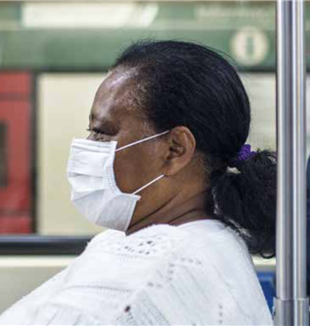
At the wellspring
In Uganda, everything was organized for a vacation with friends from various African nations. Then, some Italian friends had to cancel because of Coronavirus: the initial reaction was fear. In April Traces, from Kampala, the story of a journey of freedom.Everything was ready, well organized. Seven or eight friends from Italy were supposed to come at the end of February to Entebbe, near Kampala, on the Ugandan shore of Lake Victoria, as we have done every two years now for quite some time, for a three-day vacation at “The Source,” as we called it the first time it was held. About 40 people in all were planning to come from African countries where there are communities of the movement for a time of sharing, conversations, hikes, and communal life that would help us stay in front of the presence who seized our lives and now unites us, who is the source of our friendship.
Then, a few weeks ago, we started to receive the first news about the spread of coronavirus cases in Italy, the cancelled flights, the uncertainties, the things we all now know about. Slowly it began to be come clear that our Italian friends would not be able to come. I began to get worried and agitated because the vacation was an important time for me and their presence would be a great help.
The news reports began to pile up, and we heard that in Nigeria, where some of our friends were to come from, there were rumors of a case of the virus. I got scared. What should we do? Should we meet without the Italians? Should we postpone everything? I asked Carrón and others with whom I often speak, hoping to be told what to do, but instead they said, “Whatever you decide, we’re with you.” I was a bit disconcerted – it would have been easier if someone had said, “Go ahead with the vacation anyway” or “Don’t do it, it’s better to postpone it.”
I was nearly paralyzed. It was my call, and I was forced to engage personally, called to draw from within myself everything I had learned in the movement. And not “words”: they would not have been enough because the thoughts whirling around in my head would have prevailed. “What if they come to Uganda and put us at risk? And what if someone gets sick with the coronavirus?” It was with great gratitude and a sense of relief that I came to realize that I was not the one who would save these friends who were planning to come. Not one hair of their heads depended on me. This was a rediscovery that I did not make myself– that I do not create even a second of anyone else’s life.
I again picked up the letter Carrón wrote to Corriere della Sera for Christmas. “Our ‘I’ is worth more than the whole universe!” I read, which made me wonder, “Well, if that’s the way it is, can this ‘I’ be reduced by a virus? Can it be annihilated by everything that is happening?” This was the point from which we had to start, and I began to emerge from my paralysis. I decided that the vacation should go forward without the Italians and focus on these words, together with the provocation of the School of Community, which, taken from Generating Traces in the History of the World, spoke about faith as the “loving acknowledgment of an exceptional presence” by “the entire self, intelligence and affection, [...] moved in this acknowledgment laden with love,” moved by a real correspondence. If Jesus has attracted us to Himself in this way, who or what can take this away from us? The companionship is what enables me to stand on my own two feet, what enables me to live our circumstances with a different outlook, starting from the question: “Whose am I?” Whose, not who. That’s all. “Whose am I” in this precise instant?
Click here to read the April issue of Traces
So in Entebbe on the evening of Friday, February 28, a small group of us from Uganda, Kenya, Cameroon, and other African countries gathered together. It was reasonable to do so in that moment, and it was a very beautiful moment. We were serene, even though a lot of friends were missing. At a certain point, when some of us mentioned feeling a bit “abandoned,” I said, “Well, thank goodness this has happened. This moment is one more opportunity to become aware of what we always say to each other, of what we learn by being in the movement and following Carrón. Does the experience we live take away fear or not? Does it enable me to remember “whose I am”? We cannot give ourselves even one instant of our lives. This awareness alone can give us the peace and tranquility that I have seen among us. At the end there was a conversation by video link with Davide Prosperi, the vice president of the Fraternity of CL.
Here in Africa, people generally tend to be afraid no matter what, and so in front of a fact like the coronavirus epidemic, you can imagine how easily people can become fearful, frightened that those who govern us will hide information and not tell us what we need to know, or worse, will not warn us about the danger. Notwithstanding all of this, the tranquility and peace of which I spoke were palpable in the conversations and contributions.
Read also - Venezuela: "A human advantage"
I am grateful to the mystery, to God, who has given me this circumstance, these moments, so that I can get back on my feet. He was once again asking me, “What have you encountered? Who are you? Whose are you?” And He draws me to Himself continually. There is nothing that corresponds to me more.